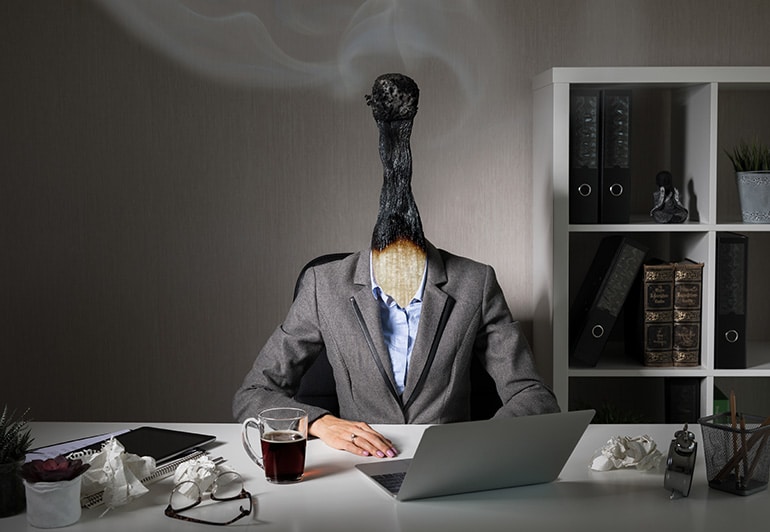From my varied conversations with clinicians, I have realized that work-related burnout is usually only a part of a larger life burnout. That is the sense of overwork, time hunger, limited agency, and perceived futility that leads to burnout (which then, of course, circles back in vicious loops to exacerbate the burnout), often extends beyond work to encompass all of life and is rooted in a more fundamental (maladaptive) stance towards life, which itself frequently increases from the burnout.
In short, many clinicians with burnout or at risk of it are living an unsustainable life in and out of work. Let me explain how this happens and possible ways out of it.
By virtue of our professions, everyone reading this is highly educated and by having successfully achieved that level of education most of us are highly conscientious. As conscientious individuals, we tend to work hard and to take responsibility for problems, even in cases in which we have not caused or contributed to them but, as responsible persons, we still take responsibility for facing and resolving them. This is our stance in the world, and it is highly effective. However, from this solid foundation, it is a short mental leap to a false conclusion, when we are surrounded by problems and face our limits in resolving them (or we resolve them at great and increasing cost), we see this as a personal shortcoming. After all, our default is to take responsibility for problems and their resolution. If the problems are resistant to resolution it is an indication of a personal shortcoming.
But this last belief, that hitting a limit in our ability to cope and to resolve because of a personal shortcoming, is an ascription of cause and not the only possible one. Such a belief can, at times, remain adaptive, pushing us to try harder, and sometimes this trying harder works: we push through obstacles and reach a new level of success, competence, or self-regard perhaps. But at some point this belief that we can overcome if we try harder becomes maladaptive. It interferes with seeing differently one’s place in the world, interferes with seeing it more accurately as a situation in which a highly competent and effective person is caught in an unsustainable situation. Instead of blaming oneself or continuing to try harder, another route is possible: realizing the current fit between the person and perceived environmental demands is unsustainable. This new perspective allows taking responsibility, not to try harder, but to try differently. In this case, a different approach is to change the unsustainable fit by addressing the shortcomings of the environment and not of the person interacting with it.
Often this unsustainable state of affairs between what the person can give and what the environment is perceived to demand is not limited to work and affects the totality of one’s waking life.
Let me introduce a new concept here, that of resource and anti-resource. Marin Heidegger, the German philosopher, developed the idea that our technological age has an instrumental orientation and treats most aspects of the world as a ‘standing reserve,’ that is, as inventory or a resource. So, a forest becomes lumber to be had, and a person becomes a worker to hire. One way to recognize burnout is when the afflicted person realizes that they perceive people and activities in their lives primarily as resources and anti-resources; by anti-resource, I mean a cost that is incurred. For example, patients come to be seen as resources, in that treating them provides income, and as anti-resources, in that treating them costs time and depletes mental and physical energies. When patients are seen in this way, they have lost their humanity. They are simply amalgamations of costs and benefits.
Let me take this one step further: this perception of people in one’s life through the lens of resources and anti-resources, or of costs and benefits, carries over into the burned-out person’s personal life. For example, one’s kids suck up time and energy, and they come with a long list of checkboxes that need to be checked off. The same with one’s significant other, who may want to talk and cuddle and get close. But this seeking of intimacy is felt as simply another anti-resource, another suck of time and emotional energy. Another way to recognize burnout, perhaps even more easily, is through realizing the presence of fantasies of just running away.
The good news is that a person can get away from this soul-sucking and unsustainable way of life without running away from everyone and everything, which until recently made their life worth living. The solution is to focus on one’s adaptive sense of taking responsibility and turning it towards changing the environment one finds oneself in. That is the first step in changing the fit between the person and the environment. Of course, once a person begins to question and change their environment, they change themselves. They regain their sense of adaptive coping and problem-solving and change how they think and behave.
The ironic thing about burnout is that it blinds normally highly skilled problem-solvers from seeing what needs to be resolved and instead mires them in taking blame and maladaptively trying the same things harder. Burnout kills flexibility of thought and outward-looking exploration and manipulation of the environment. Also, by decreasing self-esteem and sense of agency, burnout interferes with the ability to say “No” and to push back against the world’s relentless demands.
So, if you are burned out or at risk of it, I suggest the following: take stock of the inside and outside of your life, take stock of your life goals and values that transcend the present moment, stop blaming yourself for an unsustainable fit, use your natural, responsibility-taking stance and your problem-solving skills to change the environment you find yourself in, ensure the fundamentals of your life are in place like adequate sleep and diet and exercise, and remind yourself that the most important people in your life both need you and are there to help you. All you have to do is stop and ask. And then, take action.
Thanks, and take care,
Dr. Jack
LanguageBrief
“How well I know with what burning intensity you live. You have experienced many lives already, including several you have shared with me- full rich lives from birth to death, and you just have to have these rest periods in between.” – Anais Nin
“Burnout is nature’s way of telling you, you’ve been going through the motions your soul has departed; you’re a zombie, a member of the walking dead, a sleepwalker. False optimism is like administrating stimulants to an exhausted nervous system.”– Sam Keen
“The most fruitful breaks are often those we are or were forced to take by life.”– Mokokoma Mokhonoana
“Writing is a form of therapy; sometimes I wonder how all those who do not write, compose, or paint can manage to escape the madness, melancholia, the panic and fear which is inherent in a human situation.”– Graham Greene







Leave A Comment